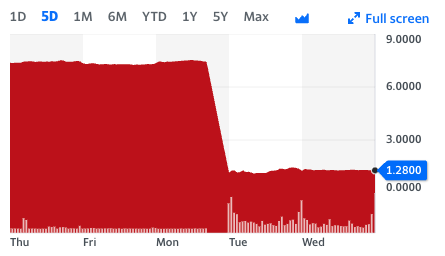Good Lord, as Norm MacDonald would say.
This sector is known for being shyte. Many of the people who invest in it seem to do it almost reluctantly, myself included. Opportunities exist, of course, but risks abound.
Take for example the news of last week: Victoria Gold’s (VGCX.TO) shocking heap leach pad failure that may ultimately be a deathblow to the single-asset producer in Yukon and cause 500 people to lose their jobs. Shareholders also got wrecked.

VGCX.TO share price falls 84%
As I wrote last month, I sold my position in the company in early May. I didn’t sell because of engineering risk but because I felt it had limited upside for the current gold bull market and its Q1/2024 production numbers were terrible. Prior to selling, I had a position, my wife had a position, and I had some in my kid’s education plan. This is actually the second time I’ve dodged a huge drawdown in a company by luck.
If the heap leach pad had failed two months earlier, I’d be sitting here deeply wounded and guilt-ridden. I’d have wasted some of my family’s money and I’d have learned an important lesson (possible lessons listed below). Instead, the risk is that I don’t learn anything from it. I look upon the incident with interest (“Egads!”) but ultimately it might not affect how I approach the sector because I dodged the bullet by chance.
But it probably should give me (and other investors) some pause. What are some possible lessons/takeaways?
- Do not invest any family money, including my own, into the sector.
- Invest in well-established and diversified royalty and streaming companies like Franco-Nevada or Wheaton Precious (note that streams are not completely safe — Osisko has a 5% NSR on Victoria’s Eagle mine that had the failure.)
- Switch to a multi-asset producer (which I did, by chance, into B2Gold, which comes with its own set of risks)
- Stop stock-picking entirely and just DCA into a broad-market ETF.
Let’s go through the list.
Re: 1 & 2. I still hold that some exposure to precious metals and commodity stocks is important and the cycles can be played to your advantage. I will continue to add exposure for the family but do so in royalties companies (e.g. FNV) or quality multi-asset producers (e.g. Agnico, Lundin Gold) that pay a dividend.
Re: 3. Yes. This is something to incorporate into the framework.
Re: 4. A “set it and forget it approach” would unlock a lot of free time for me. I’m not smart; my whole portfolio should not be individual stocks. Ideally I’d like a mix of 70% broad-market exposure via ETF and about 30% stockpicking since I feel like I enjoy it (though more enjoyment might come from a better hobby).
The problem is that I find it very hard to buy the S&P500 because of high valuations and my bias against buying the broad market when I have been holding off from doing so since around 2019. If a recession never comes, will I ever be mentally mature enough to accept my mistake and rejoin the market?
…. This post has taken a long time to write because my approach to the market can’t be described sensibly. For now, most of my cash is in a GIC awaiting lump sum dumping into the mortgage, which is sensible. For the rest in the commodity/mining space, to get out of drawing what seems like the empirically sensible conclusion (DCA into an ETF), I will give myself an extension: see how the U.S. election pans out for markets. If markets continue to hold into Q4 2024, I will start to slowly DCA.
MB
Disclaimer: This content is for informational purposes only and should not be construed as financial advice. The views expressed are those of the author, who is not liable for any losses or damages arising from any actions taken based on the information provided in this blog. Investing and trading involve risk; you are solely responsible for your decisions.
